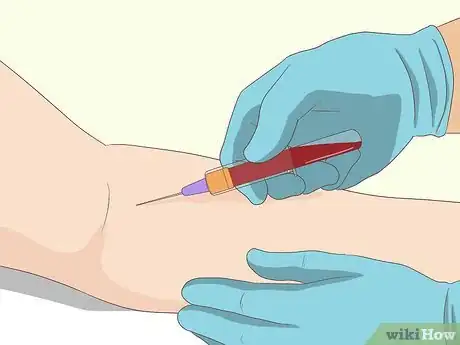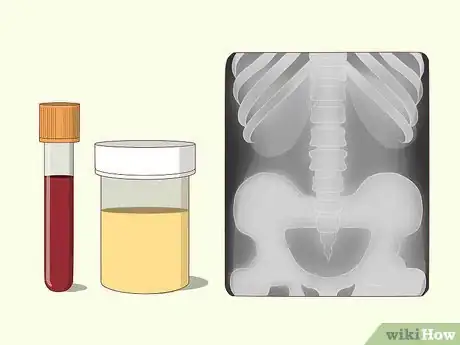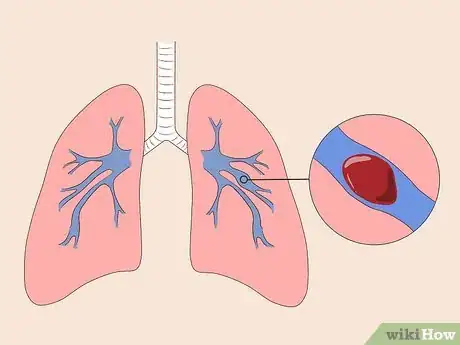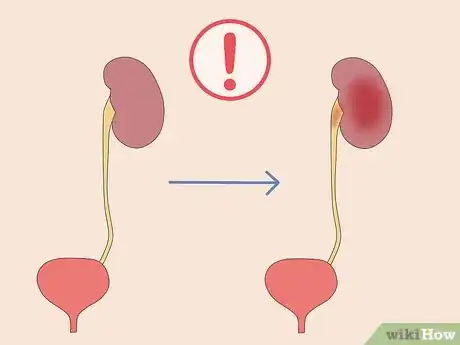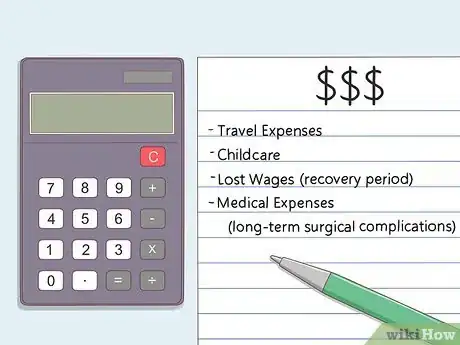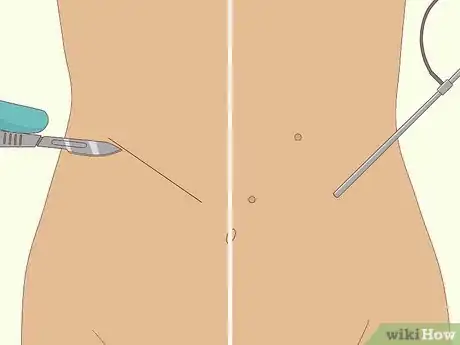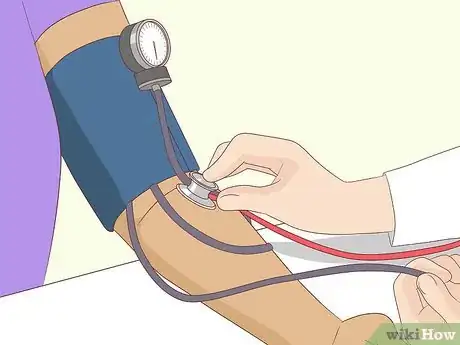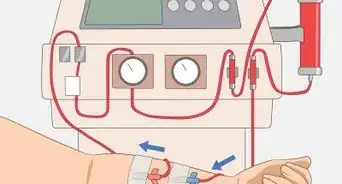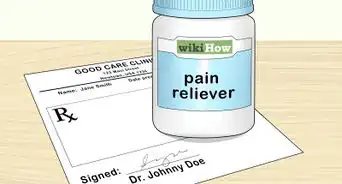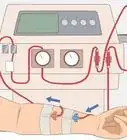This article was medically reviewed by Mark Ziats, MD, PhD. Dr. Mark Ziats is an Internal Medicine Physician, Scientist, Entrepreneur, and the Medical Director of xBiotech. With over five years of experience, he specializes in biotechnology, genomics, and medical devices. He earned a Doctor of Medicine degree from Baylor College of Medicine, a Ph.D. in Genetics from the University of Cambridge, and a BS in Biochemistry and Chemistry from Clemson University. He also completed the INNoVATE Program in Biotechnology Entrepreneurship at The Johns Hopkins University - Carey Business School. Dr. Ziats is board certified by the American Board of Internal Medicine.
There are 14 references cited in this article, which can be found at the bottom of the page.
This article has been viewed 43,903 times.
Whether you want to donate a kidney to someone you love or you just want to be a good samaritan, there’s a lot you need to know. Donating a kidney can save someone else’s life, but it is not without its risks. First, you need to do thorough research to make sure you really want to donate your kidney. Then you must endure a series of medical tests to find out if you are an eligible donor. If you pass all the tests, you’re ready to start talking to your doctor about surgery.
Steps
Getting Approved to Donate
-
1Decide to whom you will donate. You can choose to donate a kidney directly to someone you know, but only if you are a compatible match. You also have the option of donating to a stranger or participating in a paired exchange donation, which means you will donate your kidney to a stranger on the condition that a compatible stranger also donates a kidney to your loved one.[1]
- Some kidney transplant centers allow you to be a good samaritan donor, which means you can initiate a chain of donations by donating your kidney to a stranger. When you donate your kidney, the recipient’s loved one will donate hers, and so on and so forth. This will probably not directly impact anyone you know personally, but it will help a lot of people.
- If you don’t want to donate your kidney while you are still alive, but you want to help someone after you die, you can register to donate all of your organs or specific organs by signing up on your specific state’s registry or indicating your preferences on your driver’s license.[2]
-
2Contact a transplant center. Once you have decided that you would like to donate a kidney, you must contact a transplant center in order to initiate your application. The transplant center should have a nurse available to answer all of your questions and help you decide if donation is really right for you.[3]
- If you are donating to a specific person, you must contact the transplant center that has approved them for a transplant. If the person has not yet been approved, you will not be able to proceed with donating your kidney until that happens.[4]
- If you are not doing a direct donation, you have a choice regarding which facility you work with. Contact multiple facilities and ask questions regarding their success rates, their policies for matching donors and recipients, and the financial assistance they offer in order to choose the right one for you.
- Consult the U.S. Department of Health and Human Services’ Organ Procurement and Transplantation Network for a complete list of transplant centers in the United States.
Advertisement -
3Get matched. If you want to donate to a specific person, you will need to undergo blood testing to determine if you are a match. The initial screening involves a simple blood test.[5]
- You must have a compatible blood type in order to donate your kidney to a specific individual. People who have type A blood can accept blood from donors with type A or type O. People with type B blood can receive blood from people with type B or type O. People with type AB blood can receive blood from someone with any blood type. People with type O blood can only receive blood from a donor with type O blood.
- The antibodies in your blood must also be compatible with those in the recipient’s blood. In general, the more antibodies that recipient has, the more difficult it will be to find a match.
- Doctors also consider antigen matching. You do not need to be an exact match in order to donate, but research has found that an exact match does increase the success rate of the transplant.
- If you have passed all of the other tests, doctors will then perform a cross matching test, which may actually be a series of several tests. Doctors will collect cells and serum (blood without the cells in it) from both the donor and the recipient and mix them together to see if the recipient’s body is likely to reject the donor’s organ. If these tests come back negative, you will be considered a match.
- Keep in mind that if you are not a match for your loved one, you still have the option of participating in a paired exchange donation program, which will greatly increase the chances that your loved one will receive a kidney in a timely fashion.[6]
-
4Have a health screening. In order to donate a kidney, you must be healthy enough to undergo surgery and to do well afterward with only one kidney. You also must have a sufficiently low risk of developing kidney problems in the future.[7]
- Your doctor will likely perform blood tests, urine tests, x-rays, an EKG, and a CT angiogram to check your overall health and look for any abnormalities of your kidneys.[8]
- Certain chronic conditions, such as diabetes and liver disease, may disqualify you from donating your kidney.
- If you are a smoker, you will be required to quit at least one month before undergoing surgery to have your kidney removed.[9]
- You may also be disqualified from donating a kidney if you have certain diseases that could be passed on to the recipient, such as HIV or hepatitis.
- You will also be required to undergo a psychological examination in order to confirm that you are aware of the risks of donating your kidney and are choosing to do it of your own free will.
- If you have any health conditions, you might require a pre-surgical clearance from your treating doctor in order to be approved for surgery.
Considering the Risks
-
1Know the risks of surgery. Donating a kidney requires that you undergo major surgery, and this is not without risks. Make sure to talk to your doctor about the risks before you agree to undergo surgery, and always ask if you have an increased risk of complications for any reason. Although rare, some risks of surgery include the following:[10]
- Bleeding
- Infection
- Blood clots in the lung (pulmonary embolism)
- Death
-
2Understand the long-term risks. Kidney donors do not usually have shorter lifespans or a diminished quality of life as a result of the surgery.[11] There are, however, some long-term risks to keep in mind.
- While your body is perfectly capable of functioning normally with only one kidney, you will be at a disadvantage should your remaining kidney fail. If you end up needing a kidney transplant, you will be given preference as a prior donor.[12]
- Kidney donors may have a somewhat higher chance of developing high blood pressure.[13]
- Having only one kidney may prevent you from being eligible for certain military, police, and fire fighting jobs.[14]
-
3Figure out the finances. Most of the time, your medical expenses will be covered by either the recipient’s insurance or by the transplant center if you choose to donate a kidney. Make sure to find out if you will be responsible for any costs. Also, keep in mind that the surgery may have many hidden costs that are not covered. The following expenses are typically not covered, although you may be able to get help with them by contacting a nonprofit agency:[15]
- Expenses for travel to and from the transplant center
- Childcare
- Lost wages during your recovery period
- Medical expenses related to long-term surgical complications
Having the Surgery
-
1Ask the doctor what kind of surgery you will have. There are two different surgeries your doctor may perform to remove your kidney: an open incision removal and a laparoscopic procedure. The laparoscopic procedure is much less invasive, which means there are fewer risks involved and the recovery time is shorter.[16]
- A laparoscopic procedure means that instead of making a large incision and the surgeon using their hands to do the surgery inside your body, a very small set of incisions are made and instruments with long handles are inserted into the holes. The surgeon uses the instruments to do the surgery without ever opening up the abdomen.
- The laparoscopic procedure may not be an option for all patients, depending on their surgical histories and the anatomy of the individual's kidney and whether it can be accessed and removed with the laparoscopic instruments alone.
-
2Follow all pre-operative instructions. Your doctor will give you specific instructions that you must follow prior to surgery. Most commonly, you will be restricted from eating and drinking in the hours leading up to your surgery, usually beginning the night before. This is to prevent aspiration of food into your lungs when you are under anesthesia. It is very important to follow these and all other instructions, as they are meant to reduce your risk of surgical complications.[17]
- Make sure your doctor knows about all of the medications you are taking. You may be required to stop some medications prior to surgery.
-
3Be prepared for the recovery period. Depending on the type of surgery and a host of personal factors, recovery typically takes anywhere between one and six weeks. You should expect to experience pain, discomfort, and fatigue while you recover.[18]
- It’s a good idea to have a caretaker available to help you with daily activities, like preparing meals and
- You may have to spend a few days recovering in the hospital before you are sent home.
- People who are in good shape tend to recover from surgery faster than people who are out of shape, so you might want to begin an exercise regimen before your surgery.[19]
- Moving around in the days following your surgery will help you avoid complications, such as blood clots.[20]
-
4Get follow-up treatment. Your doctor will probably have you come in for at least one post-surgical check-up. The purpose of this is to make sure you are healing properly, so be sure to go to all scheduled appointments.[21]
- It is also important to continue getting regular medical checkups throughout your life. Your doctor may want to monitor your kidney function to make sure your remaining kidney is functioning properly.
-
5Adhere to post-surgical restrictions. When you are released from the hospital, your doctor will give you a list of activities that you should avoid for certain periods of time. These restrictions are meant to help you heal and to protect you from injury, so it is very important that you follow them.[22]
- You should not do any heavy lifting in the weeks following your surgery. Your doctor will provide you with specific guidelines.
- Depending on the type of work you do, you may not be medically cleared to return to work for several weeks. The more strenuous your job, the longer you will be out of work.
- Women are typically advised not to become pregnant for six months after donating a kidney.
- Some doctors recommend that kidney donors avoid contact sports like football and wrestling, due to the potential for injury to your remaining kidney.
Expert Q&A
-
QuestionCan I donate my kidney to someone who is not in my country and is there a reward for kidney donation?
 Mark Ziats, MD, PhDDr. Mark Ziats is an Internal Medicine Physician, Scientist, Entrepreneur, and the Medical Director of xBiotech. With over five years of experience, he specializes in biotechnology, genomics, and medical devices. He earned a Doctor of Medicine degree from Baylor College of Medicine, a Ph.D. in Genetics from the University of Cambridge, and a BS in Biochemistry and Chemistry from Clemson University. He also completed the INNoVATE Program in Biotechnology Entrepreneurship at The Johns Hopkins University - Carey Business School. Dr. Ziats is board certified by the American Board of Internal Medicine.
Mark Ziats, MD, PhDDr. Mark Ziats is an Internal Medicine Physician, Scientist, Entrepreneur, and the Medical Director of xBiotech. With over five years of experience, he specializes in biotechnology, genomics, and medical devices. He earned a Doctor of Medicine degree from Baylor College of Medicine, a Ph.D. in Genetics from the University of Cambridge, and a BS in Biochemistry and Chemistry from Clemson University. He also completed the INNoVATE Program in Biotechnology Entrepreneurship at The Johns Hopkins University - Carey Business School. Dr. Ziats is board certified by the American Board of Internal Medicine.
Internal Medicine Physician In the US it is illegal to get paid for organ donation. In some countries it may be legal.
In the US it is illegal to get paid for organ donation. In some countries it may be legal.
Warnings
- Take this decision seriously! This is a major surgery that you are considering.⧼thumbs_response⧽
References
- ↑ https://www.kidneyregistry.org/for-donors/
- ↑ https://www.kidney.org/transplantation/livingdonors/what-if-not-match
- ↑ https://www.kidney.org/transplantation/livingdonors/where-do-start-anonymous
- ↑ https://www.kidney.org/transplantation/livingdonors/where-do-start
- ↑ http://www.lkdn.org/matching_recip_donors.html
- ↑ https://www.kidneyregistry.org/for-donors/
- ↑ http://www.hopkinsmedicine.org/transplant/news_events/media/transcripts/kidney_pancreas/what_kidney_donors_need_to_know.html
- ↑ http://umm.edu/programs/transplant/services/kidney/living-donor/faq
- ↑ http://umm.edu/programs/transplant/services/kidney/living-donor/faq
- ↑ https://www.kidneyregistry.org/for-donors/
- ↑ http://www.mayoclinic.org/tests-procedures/nephrectomy/expert-answers/kidney-donation/faq-20057997
- ↑ https://www.kidney.org/transplantation/livingdonors/what-expect-after-donation
- ↑ https://www.kidney.org/transplantation/livingdonors/making-decision-to-donate
- ↑ https://www.kidney.org/transplantation/livingdonors/making-decision-to-donate
- ↑ https://www.kidney.org/transplantation/livingdonors/financial-insurance-issues
- ↑ https://www.kidneyregistry.org/for-donors/
- ↑ http://umm.edu/programs/transplant/services/kidney/living-donor/faq#q13
- ↑ https://www.kidney.org/transplantation/livingdonors/infotips
- ↑ https://www.kidney.org/transplantation/livingdonors/infotips
- ↑ http://umm.edu/programs/transplant/services/kidney/living-donor/faq#q13
- ↑ http://umm.edu/programs/transplant/services/kidney/living-donor/faq#q13
- ↑ https://www.kidney.org/transplantation/livingdonors/what-expect-after-donation
- ↑ https://www.kidney.org/transplantation/livingdonors/general-information-living-donation
- ↑ https://www.kidney.org/transplantation/livingdonors/general-information-living-donation
- ↑ https://www.kidney.org/transplantation/livingdonors/where-do-start
- ↑ https://www.kidney.org/transplantation/livingdonors/financial-insurance-issues
- ↑ https://www.kidney.org/transplantation/livingdonors/what-expect-after-donation
About This Article
If you want to donate your kidney, contact a transplant center to start your application. If you’re donating to a specific person, you’ll need to get a blood test to determine if you and the person are a match. If your blood test checks out, you'll also need to have a health screening to confirm that you are healthy enough to undergo surgery and to do well afterward with only one kidney. Your doctor will likely perform blood tests, urine tests, x-rays, an EKG, and a CT angiogram to check your overall health and look for any abnormalities of your kidneys. You may be disqualified from donating if you have diabetes or liver disease. Before you proceed with the donation, make sure you are aware of the risks of surgery, including bleeding, infection, blood clots, or even death in rare cases. For more tips from our Medical co-author, like how to recover from kidney donation surgery, keep reading!


